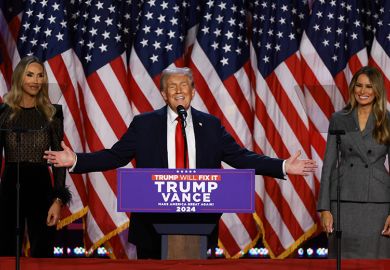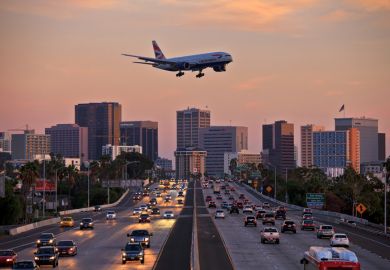US universities were bracing themselves for four years of “playing defence” on international students against the anti-immigration policies expected in president-elect Donald Trump’s second term.
His first four years in power offer some clues as to what might be in store: he tightened visa issuance, attempted to block international students on online courses from remaining in the US during the pandemic, and proposed limiting student visas for citizens from certain countries.
“Together, these measures created a clear message: the US wasn’t exactly rolling out the welcome mat for international students, and this perception likely dampened international student enrolment,” Maia Chankseliani, associate professor of comparative and international education at the University of Oxford, told Times Higher Education.
During Mr Trump’s four years in office, international student enrolment declined, while delays in student visa processing increased, as did denial rates for the crucial H-1B visa.
Dr Chankseliani said there was a real risk that Mr Trump’s anti-immigration rhetoric around the border would impact student visas.
“Even though student visas serve a different purpose than other visa categories, the rhetoric and policies could easily bleed over, particularly if student mobility is viewed through a security lens rather than a soft power, international development, or economic lens,” she said.
She warned that students from countries seen as geopolitical rivals by the US could be most impacted by a second Trump term, with China likely at the forefront of this.
Miriam Feldblum, executive director of the Presidents’ Alliance on Higher Education and Immigration, said Mr Trump’s policies “adversely impacted international students and certainly created some chilling effects”, warning that “xenophobic” rhetoric can have real impacts.
With other sectors, such as the UK, Australia and Canada, clamping down on international students in differing ways, Dr Feldblum said the US could soon experience something similar.
“It would have been great to have an administration that embraces the promise and prospects of global talent and of immigration…now we have to ensure that we’re maintaining our competitive advantage,” she said.
Dr Feldblum said the biggest fear was that the sector spent the next four years “on defence” rather than advancing practical bipartisan solutions.
“We have a role to play now, not to panic, but to prepare and to continue with our policy education and with creating a wide-tent coalition,” she said. “I think that there is concern and anxiety about what we have seen before but determination and preparation for what’s ahead.”
Fernando Reimers, Ford Foundation professor of practice in international education at Harvard University, warned that a severe decrease in international student recruitment would compound challenges colleges already face.
Declining domestic enrolments, increasing costs and dwindling appreciation of the value of higher education could result in colleges most dependent on tuition funding facing “near-term extinction”, he said.
However, Fanta Aw, chief executive of Nafsa, the Association of International Educators, said she did not expect a fall in international enrolment because many other parts of the world were also at “inflection points”.
“We know that we're going to need to be very proactive on lots of fronts,” said Dr Aw. “We also know that even in areas where there will be vehement disagreements, there is still some common ground that is possible.”
Register to continue
Why register?
- Registration is free and only takes a moment
- Once registered, you can read 3 articles a month
- Sign up for our newsletter
Subscribe
Or subscribe for unlimited access to:
- Unlimited access to news, views, insights & reviews
- Digital editions
- Digital access to THE’s university and college rankings analysis
Already registered or a current subscriber? Login








